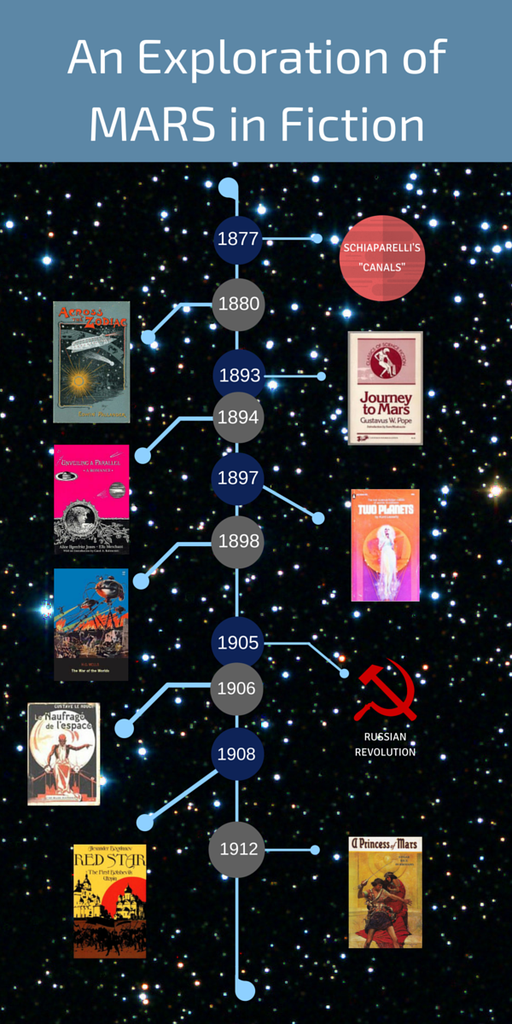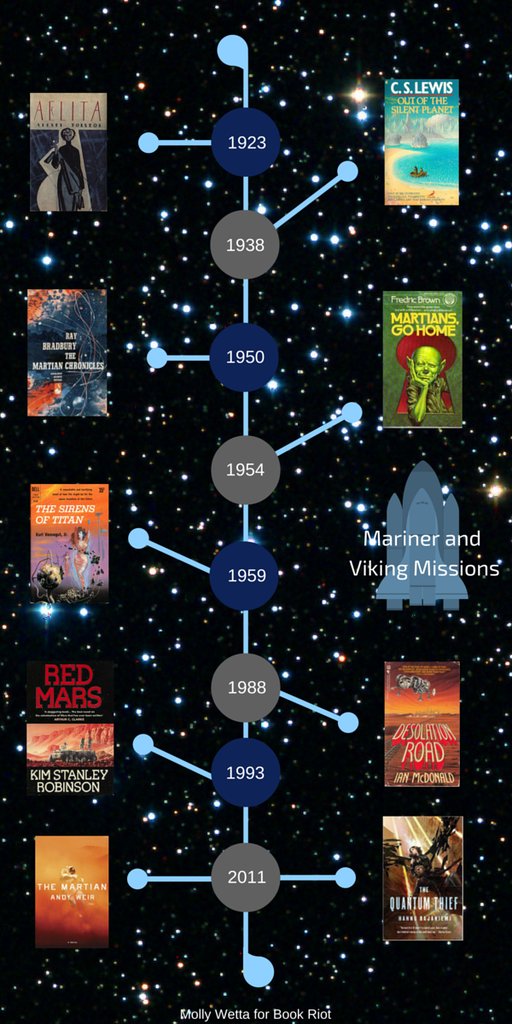Carl Sagan said in his 1980 book Cosmos: “Mars has become a kind of mythic arena onto which we have projected our Earthly hopes and fears.” This is certainly true in the way Mars has been used by novelists. While inspired by scientific discovery, books about Mars have also demonstrated the themes of social and political discourse of the times in which they were written. No other heavenly body has captured the world’s imagination like the Red Planet. Stories use Mars to explore our fear of invasion, but also the adventure of exploration. Here’s a (condensed) timeline of Mars in fiction.
Across the Zodiac by Edwin Pallander (1880) This first time Mars appeared in fiction was just a few years after an exciting discovery by Italian astronomer Giovanni Schiaparelli. In 1877, he described shading on the surface of Mars as canalli, meaning channels, but the term was translated into English as “canals” and taken to imply that if not “man-made,” these waterways were proof that sentient creatures had constructed them. Although later revealed to be mere optical illusions, the idea inspired much speculation about life on Mars. Just few years later, the planet first appears in fiction in Across the Zodiac, in which an explorer travels to Mars, but isn’t able to convince the aliens he encounters that he’s from Earth. This novel also most likely contains the first appearance of an alien language. Science fiction increases in popularity during the last years of the 19th century, and the Red Planet continues to make appearances. Journey to Mars by Gustavus W. Pope (1893) In Journey to Mars, Arctic explorers discover aliens! They transport the humans to Mars, where they encounter advanced technology but a feudalistic society. The best of both worlds: TVs and swordplay! Unveiling a Parallel: A Romance by Alice Ilgenfritz Jones and Ella Merchant (1894) It doesn’t take long at all for Mars to be used as a way to demonstrate feminist ideals. This early Mars novel is a satire in which a delegation from Earth visit Mars and study two societies: one in which women take on all the negative characteristics of men and masculinity (spoiler: it doesn’t work out). The other community of aliens enjoys perfect gender equality, and everyone is happy and peaceful. Two Planets by Kurd Lasswitz (1897) You know the big eyed aliens of Area 51? This is where that description originated. They really did come in peace, at least in this story. The War of the Worlds by H.G. Wells (1898) Perhaps the best known of Mars fiction, this classic has never been out of print, and even influenced the work of scientists, notably Robert Goddard, who (inspired by the book) developed the rocket and fuel used during the Apollo 11 moon landing. Red Star by Alexander Bogdanov (1908) Mars fiction gets political! The fascination with the Red Planet was used as a vehicle for Russian Communist propaganda. In Red Star, a scientist-revolutionary travels to Mars to experience their socialist system and to teach Martians about his own world. Not only did this novel have a strong political point of view, it also showed remarkable foresight in predicting technology like nuclear fusion and propulsion, atomic weaponry and fallout, computers, blood transfusions. Vampires of Mars by Gustave LeRouge (1908) You know a genre comes into its own when it finally has a vampire novel. In this amazingly weird novel, an explorer is transported to Mars via psychic power and encounters bat-winged, blood-sucking vampires controlled by a giant brain! They send him home, but not without some new friends (oops!). This work is notable in that it blends science fiction and psychic phenomenon, creating a new cross-pollinated genre. A Princess of Mars by Edgar Rice Burroughs (1912) This is pulp-y planetary romance at its finest. John Carter is a Confederate soldier who doesn’t age. He wakes up on Mars (naked!) and impresses a Martian with his superhuman strength that’s really just a result of the low gravity on the Red Planet. Obviously, he falls in love and saves a princess. Basically, he’s the Best. At. Everything. There’s no mistaking John Carter’s awesomeness—he tells you all about it, direct from his first person perspective. Aelita by Aleksey Tolstoy (1923) More Russian propaganda as Mars sci-fi romp! Explorers encounter an advanced civilization on Mars (they’re descendants from the lost colony of Atlantis!) and what follows is a treatise on class conflict. Out of the Silent Planet by C.S. Lewis (1938) C.S. Lewis was bemoaning modern fiction with his pal J. R. R. Tolkien and decided to write a space fantasy. While the plot mirrors the works of Wells, the message and theme are quite the opposite. There’s a reason that Lewis has a reputation for injecting his fantasy with a heavy dose of his own theological perspective. Red Planet by Robert Heinlein (1949) Boarding school on Mars! This novel includes first appearance of Heinlein’s idealized Martian elder race. The Martian Chronicles by Ray Bradbury (1950) This collection of short stories is structured as a “future history” that explores an extinction of both Earth and Mars. It’s Bradbury, and should be part of any readers exploration of Mars fiction. And if you weren’t sold on the multi-volume John Carter series, Bradbury would also insist you read it, too—he definitely claimed it influenced him. Arthur C. Clarke’s The Sands of Mars (1951) and Isaac Asimov’s The Martian Way (1952) try to imagine in practical terms what kind of effort it would take to colonize Mars and make it livable for humans. Martians, Go Home by Frederic Brown (1954) More satire – this time with little green men! An alien invasion story that popularized the portrayal of Martians as small and green, although the description had been used for at least 40 years. The Sirens of Titan by Kurt Vonnegut (1959) While not really about Mars, Vonnegut uses interplanetary space travel as a backdrop to explore free will and human agency with incisive wit, black humor, and irony. The Mariner and Viking voyages of the ’60s and ’70s led to a chilling effect on Mars fiction, since photos from the missions revealed that conditions were inhospitable to human life. Yet the ’90s saw a renewed interest in Mars, in part because of a commitment from the first President Bush to have a manned mission to Mars and Buzz Aldrich’s ambitious plan to colonize the planet. Mars fiction starts to blend genres as well as integrate hard science. Desolation Road by Ian McDonald (1988) A mash-up of sci-fi and magical realism, these interconnected stories explore the quirky characters in a town that’s just a stop on the railroad across Mars. Red Mars by Kim Stanley Robinson (1993) Robinson’s series tells the story of many generations who colonize and terraform Mars, with all of the political, social, and personal drama that will surely accompany such an endeavor. The Quantum Thief by Hannu Rajaniemi (2011) A far-future blend of espionage, adventure, thrills, and imaginative technology set on Mars. The Martian by Andy Weir (2011) And this brings us to the originally self-published sensation adapted into a movie starring Matt Damon (how much has Hollywood spent rescuing him?). Weir “scienced the shit” out of this one, so much that during a talk my local library recently hosted, physicists and astronomy professors had only minor quibbles with the way the science in this ill-fated mission to Mars in which an astronaut is left for dead and must figure out how to survive on the desolate planet. What does the future hold for the future, both in our journey to Mars, and for the Red Planet’s place in fiction? Not only scientific discovery, but social change and literary invention, will influence these stories. Is your favorite story of Mars in fiction left off this list (believe me, I know it’s far from comprehensive). Share your recommendations for exploring the Red Planet in the comments!

